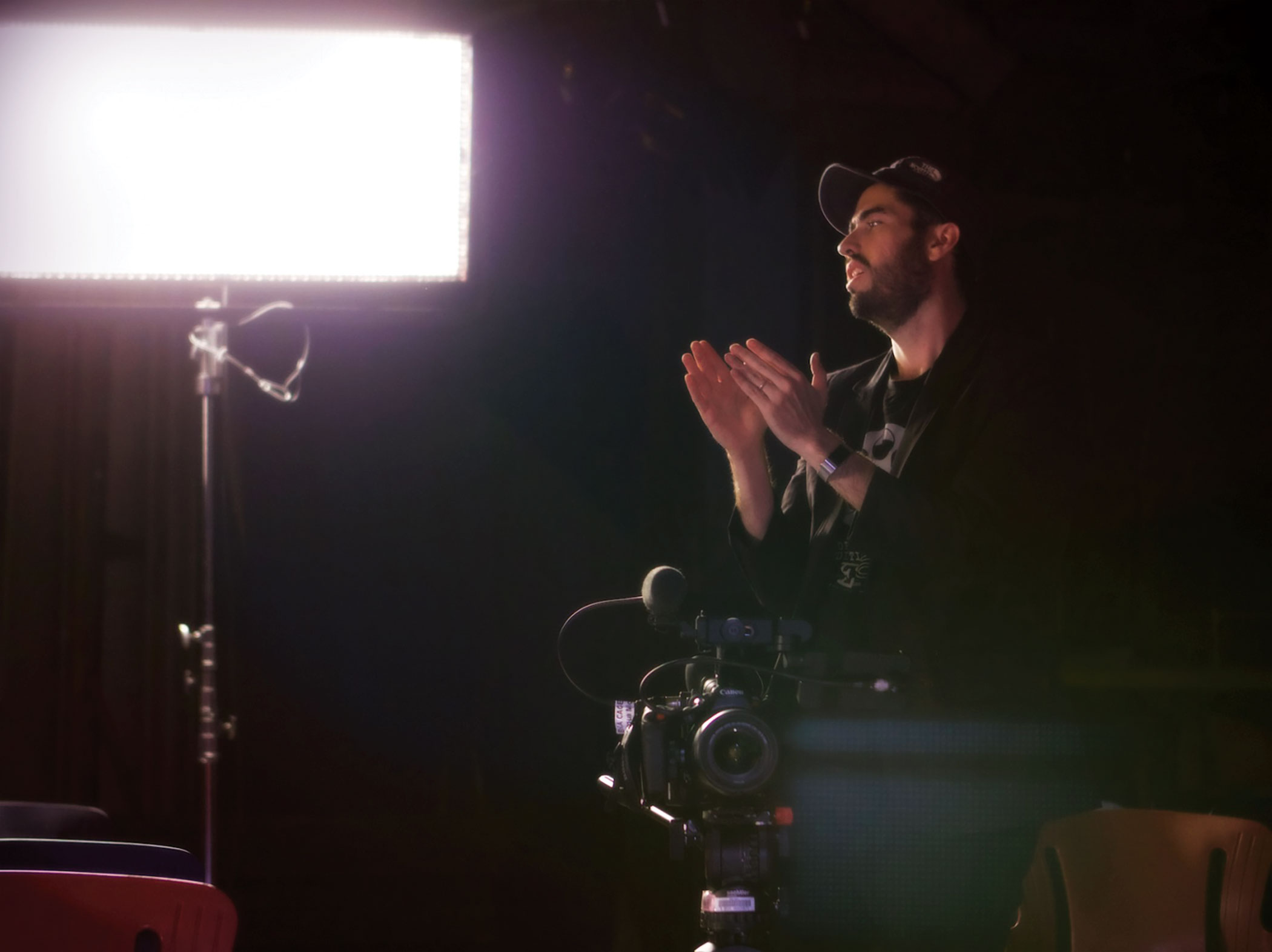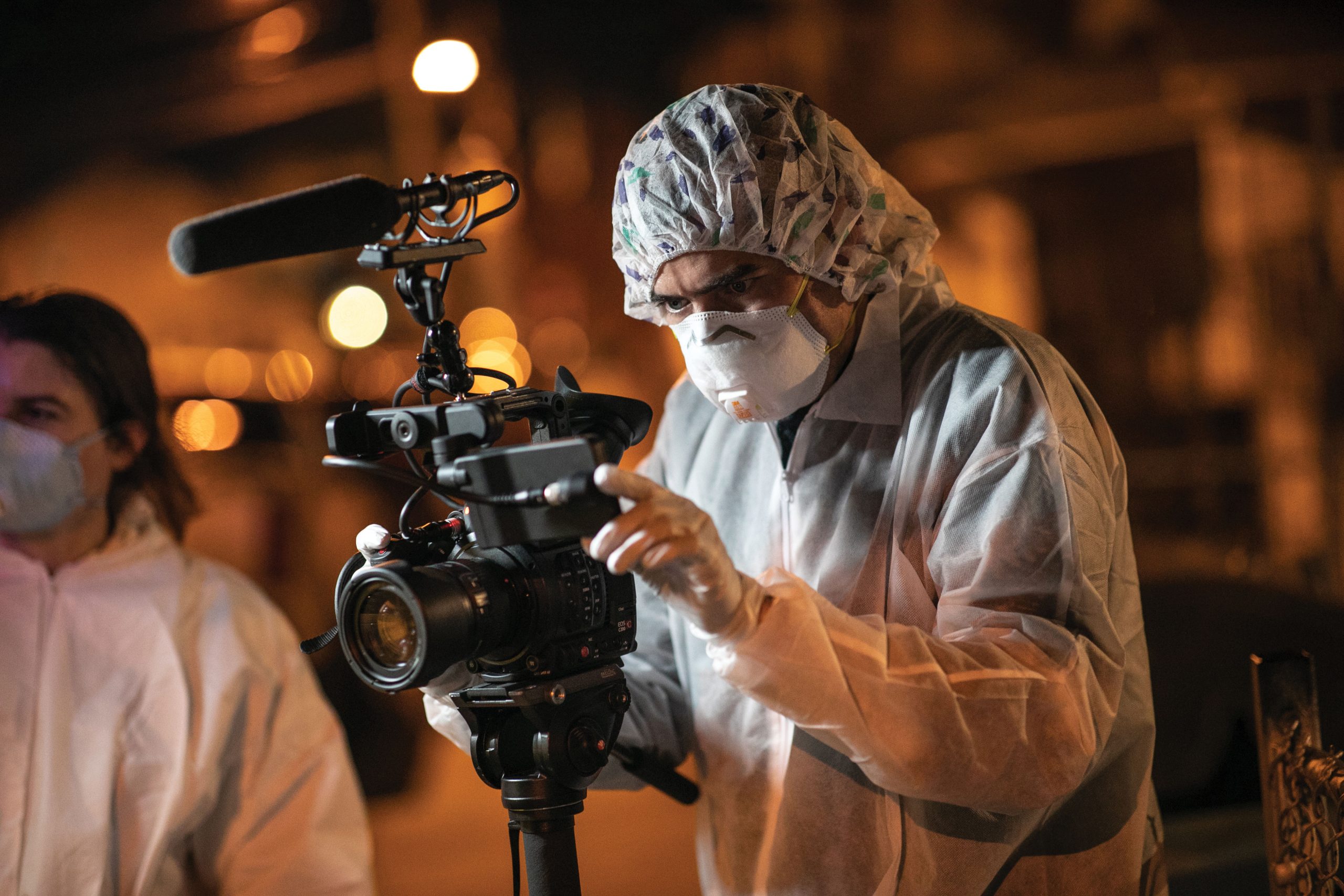Love, Life, and the Miracle Movies of Oscar Guerra

Emmy Award–winning filmmaker Oscar Guerra wants to have a conversation about immigration. Not a policy debate or a campaign rally or, god forbid, a made-for-cable screaming match. But an honest and open talk about what it means to be a working-class Latinx immigrant in America in the 21st century.
An assistant professor of film and video production at UConn Stamford, Guerra makes intimate, human-scale documentaries. His vulnerable subjects — a mother who gives birth while gravely sick with Covid, a family trapped at the U.S. border after fleeing death threats from a drug cartel in Honduras — invite viewers to reassess what they think they know about the struggles, sacrifices, and dreams of marginalized humans whose voices often can’t be heard above the shouting.
“I think that once you invite people to have this conversation, you can start connecting,” says Guerra. “Hey, we both have kids. What would you do for your kids? Everything. Everything. I would do the same.”
Guerra’s “Frontline” documentary “Love, Life, and the Virus” just won the 2021 national Emmy Award for Best Story in a Newsmagazine. The film is about a Guatemalan family in Stamford, Connecticut, whose already precarious world is turned upside down when the expectant mom, Zully, is rushed to the hospital with Covid.
“I thought it was a prank. A raspy voice saying, ‘I’m dying. Please take care of my baby.”
With her husband, Marvin, a restaurant worker, and 7-year-old son, Junior, also infected, Zully knows her baby won’t be able to go home. Just before being put in a coma for an emergency delivery, she calls the only person she can think of who might help — Junior’s elementary school teacher.
“I thought it was a prank,” recalls Luciana Lira, the teacher. “A raspy voice saying, ‘I’m dying. Please take care of my baby.’” Incredibly, she does. Lira nurtures the newborn for five weeks as medical professionals and community organizations rally around the family, nursing Zully to health and an emotional reunion with Marvin, Junior, and healthy infant Neysel.
“It’s almost a case study of what can happen when we work together as a community,” says Guerra. “The story is a miracle. This is not the reality for most low-income Latinos. But it shows that when we’re here for each other, things can work out even in the most dire circumstances, like the peak of a pandemic.”
Broadcast last August in English to a national audience on “Frontline,” the long-running PBS investigative series, and in Spanish to an international one on Univision’s acclaimed “Aquí y Ahora” program, “Love, Life, and the Virus” had also been nominated for an Emmy in the Outstanding Feature Story in a Newsmagazine category. And it was a finalist in the 2021 Dart Awards competition, administered annually by the Dart Center for Journalism and Trauma at Columbia University.

Digital Media & Design professor Oscar Guerra, in personal protective gear while filming “Love, Life, and the Virus,” calls his 2021 Emmy Award–winning documentary “almost a case study of what can happen when we work together as a community.”
The American Dream
An immigrant himself, Guerra came to the United States from Mexico to study at the University of North Carolina at Chapel Hill, where he earned a doctorate in mass communication in 2014. He holds a bachelor’s in communication and a master’s in marketing from Tecnologico de Monterrey University in Mexico City, one of Latin America’s most prestigious private universities.
“I wanted to savor the academic environment that is so rich and beautiful in the States,” Guerra says of his decision to live and study here. “I grew up in Latin America, I’ve lived in Europe, but for the college experience, this is paradise.”
Despite his credentials, Guerra at a certain point found himself struggling to adjust to life in his new country. He remembers thinking, “If it’s so hard for me, I’m 28 years old, I have my bachelor’s, my master’s, what must it be like for an 8-year-old who has nothing?”
At that moment, Guerra says, it was like a switch went on. It became his mission, “almost a moral responsibility,” to document the immigrant experience.
“I believe in the American dream. It has maybe shifted from what it once was, but I believe in the American dream. I love this country and I think that we immigrants who helped build the country are still building the country — the stories need to be told, because that is the only way we can get to know people.”
Guerra is teaching video editing this fall and has a grant from UConn Research Excellence to work on “Covid-19 Vaccine Rollout in Stamford, CT: A Multimedia Archiving Project,” with Glenn Mitoma and Kathy Libal of UConn’s Human Rights Institute.
He also is at work on a new as-yet-untitled documentary for “Frontline.” It traces families who were separated at the border during the U.S. government’s zero-tolerance immigration policy. The film will be supported by a companion website that Guerra and UConn students are developing as an academic resource with colleagues from Syracuse University. The site will include background information on zero tolerance as well as complete interviews and other source material not seen in the film’s tightly edited final cut. Assuming the production clears various intricate legal and social hurdles, it will air on PBS this fall.
Guerra says he is continuously humbled by the people who entrust him with their stories. “As a filmmaker, the journeys are a project. For the people you’re working with, it’s their life.”
By KEVIN MARKEY

Leave a Reply